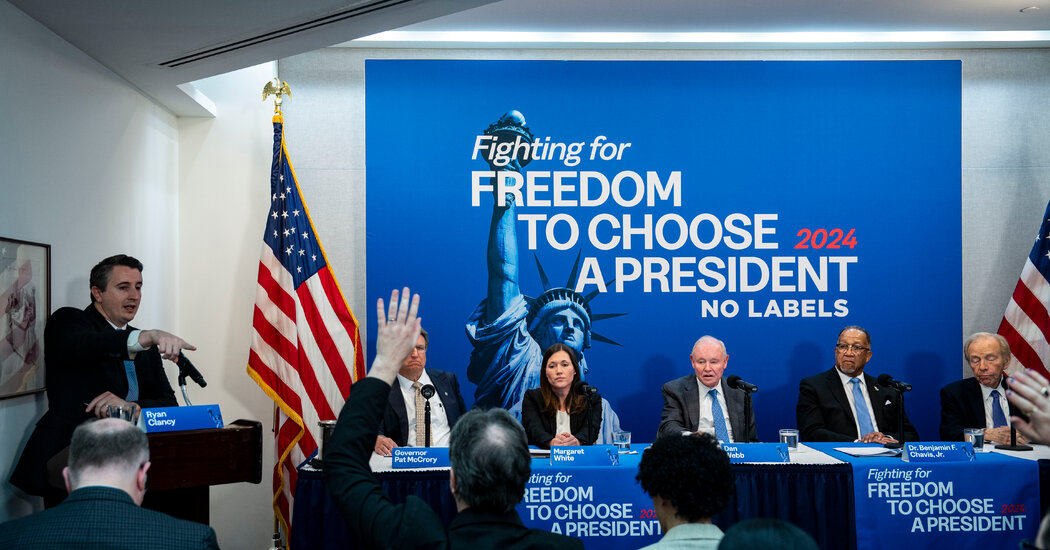The centrist group No Labels has abandoned its plans to run a presidential ticket in the 2024 election, having failed to recruit a candidate, its leader, Nancy Jacobson, said on Thursday.
The group, which said last year it had raised $60 million to put forward what it called a bipartisan “unity ticket,” had suffered a string of rejections in recent months as prominent Republicans and Democrats declined to run on its ticket. The group had told donors and members that it would put forward a candidate if President Biden and former President Donald J. Trump were the main parties’ nominees.
“Today, No Labels is ending our effort to put forth a Unity ticket in the 2024 presidential election,” Ms. Jacobson said in a statement. “Americans remain more open to an independent presidential run and hungrier for unifying national leadership than ever before. But No Labels has always said we would only offer our ballot line to a ticket if we could identify candidates with a credible path to winning the White House. No such candidates emerged, so the responsible course of action is for us to stand down.”
The Wall Street Journal earlier reported the decision by No Labels to forgo a presidential campaign.
The group’s move means one fewer outsider campaign for the major parties to worry about, in a presidential field that has several independent and third-party candidates.
For months, Democratic allies of Mr. Biden, who viewed No Labels as a prominent threat to his re-election effort, had worked to marginalize the group and pressured potential candidates not to agree to run on its ballot line. In recent weeks, the party apparatus has focused its attacks on Robert F. Kennedy Jr., the political scion mounting an independent campaign for president.
“From the beginning, our intent was to convince candidates that they should not accept the nomination,” said Matt Bennett, a co-founder of Third Way, the centrist group at the middle of the effort to block No Labels’ efforts. “We and our allies in a broad coalition made the case that not only was there absolutely no hope of winning, but they would be spoilers for Trump.”
By last fall, No Labels’ leadership was prospecting among moderate Republican politicians to run as the group’s candidate. But even among them, the recruitment efforts stumbled. As other outsider candidates emerged, No Labels began to seem like less of a threat.
In a statement on Thursday, No Labels said it would “build on the momentum we have gained over the last year to continue representing unity and giving voice to America’s commonsense majority.”
When former Senator Joseph I. Lieberman, the highest-profile No Labels supporter, died last week, the organization was left with little political firepower to recruit potential candidates. At that point, it had been turned down by figures including Senator Joe Manchin III of West Virginia and former Govs. Larry Hogan of Maryland, Jon Huntsman of Utah and Bill Haslam of Tennessee.
“There was tremendous pressure on people economically and politically not to do it,” said former Representative Tom Davis of Virginia, a No Labels co-founder. “What’s after this? You run, you lose. You help elect Trump.”
No Labels was facing deadlines in the coming weeks to secure access to state ballots, some of which require a full presidential ticket on the application. On Thursday, Ms. Jacobson said the group was on the ballot in 21 states.
The group also tried to court Nikki Haley and Chris Christie, both former Republican governors who abandoned their presidential bids this year. Both declined. Another prospective recruit, former Lt. Gov. Geoff Duncan of Georgia, a Republican, withdrew his name from consideration last month.
David H. Petraeus, the retired general and former C.I.A. director, was also approached and said no, he told The New York Times last month.
Only some would-be No Labels recruits talked publicly about why they had declined the group’s overtures. But several seemed to share Mr. Christie’s sentiment.
“If my candidacy in any way, shape or form would help Donald Trump become president again,” he said last week, “then it is not the way forward.”


